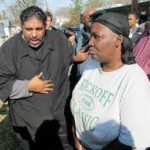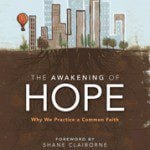I was on Greenville College’s campus yesterday to preach their Convocation and kick off a great senior seminar they have here on “abundance and need.” Was reminded of why I’m so glad I went to a Christian liberal arts school and why I continue to think they’re important today: they create the possibility of a lively conversation between young people and older adults about what God wants us to be doing in the world. As I talk to students on campuses like this, the question of vocation is always at the forefront of their mind. And what I find myself saying, over and again, is that I think it’s more important to figure out where you belong these days than to know just what you’re supposed to be doing.
It’s not that what you do doesn’t matter.
It’s just that without a place in this culture, most of us don’t have a people. And without a people we are left with ourselves. We become too easily what Benedict called “slaves to our own will.”
These conversations reminded me of an exchange I had recently with students from Westmont College who’d read my book The Wisdom of Stability. Thought I’d share it here.
My question is, “What does stability look like for you currently?”
Well, if you want to be held accountable, write a book about what you believe. Then someone will ask a question like this and you’ll have to keep thinking about that thing that you said was so important four years ago.
I still live in the same house in the same neighborhood with more or less the same people (we always have new interns and guests, but the core of our community is the same as it was four years ago). I’m a member of the same church, work the same job, have most of the same friends—and, I suppose, some of the same enemies. A lot of my life feels pretty stable.
But one of the things I realized reading all that literature on stability is that getting your rhythms stable and your body in one place creates a space for you to explore the tumultuous seas of your soul. You have to do the hard work that comes up in every real relationship of knowing yourself and those who are close to you. All of that isn’t easy. But there’s an incredible beauty in seeing how grace sustains us, even when we feel how vulnerable we are. I think that’s what stability looks like to me right now—like leaning on the everlasting arms.
What are the most common objections that people make to what you write about staying in one place? Where do you get the most push back?
Good evangelicals always say, “But wait a minute. Didn’t Jesus say, “Go into all the world…? Aren’t we supposed to leave everything to follow Jesus?” And my answer is always, “Yes. Absolutely.” The wisdom of stability doesn’t deny God’s call to mission. More and more, I’m convinced that the church cannot recover the misio Dei without it.
It’s fascinating to me that the organizations that have connected with this book the most strongly are missions organizations. Their leaders tell me that it speaks to a deep need they’ve felt for some time. Because there’s a huge problem in American missions. The average stay on the field is something like two years. American Christians want to go, but when they get there they find it hard to stay. Having inherited the habits of a hyper-mobile culture, they can’t connect to the places where they’re going to share God’s good news. Conversations with these mission agencies have helped me to see that we need the wisdom of stability whether we stay or go.
What would you say are the biggest factors in choosing where to “root” one’s self?
There are lots of things to think about, of course. Where are God’s people needed? What gifts do you have to offer? Is this a place where you could raise your kids? Are you called to be single in community? But, ultimately, I don’t think we get to “choose” in the since that the market teaches us to choose as savvy consumers. Because faithfulness isn’t about figuring out what the best deal is for you. It’s about opening your life to God’s call and saying, “Yes. Here I am. Use me.”
I will say, though, that this is a choice in a very different sense. I don’t want to over-spiritualize God’s call—as if we all have to sit around with our heads bowed and our eyes shut until we see a neon sign that says, “Stay here.” No, God speaks through the circumstances of our lives—especially, in my experience, through the interruptions. We learn to listen by paying attention to the interruptions, reading them in light of the story that Scripture tells, and doing something about it.
What is the role of the church and what does the church look like in your community? Is the church interchangeable with your community or is it something separate?
The church is a holy mystery—the living body of Christ in the world. I’m not going to try to nail that down in a definition. But I believe in local congregations. I believe in gatherings of God’s people that worship together on Sundays and host pot lucks on Wednesdays and marry and bury people from one generation to the next. My friend Phyllis Tickle calls this “inherited church.” I’m a member and a minister at the St Johns Missionary Baptist Church, and that’s an important part of my life.
But I’m also a member of Rutba House, and I’m deeply grateful for this small community of people who are trying to be the church together 24-7. No, it’s not for everyone. I’m not saying every Christian needs to live in this kind of intentional community. But I think communities like ours have their place within the mystery of Christ’s body. Historically, these communities have been called “monastic.” Which is why I sometimes talk about what we’re up to as a “new monasticism.”
How do you go about finding and exploring new things about the place you live in? Does it get old/exhausting?
I suspect there are some things you can’t begin to notice about a place until you’ve been there ten or twenty years, just as there are things I didn’t know about my wife until we’d been married for a decade. Of course, you can live in a place—or live with another person—and miss these things. But if you’re trying to pay attention, particular people and places seem infinitely fascinating to me.
If I were a different kind of writer—of I had the imagination of Flannery O-Connor—I’d write a novel about Walltown from the perspective of our mail man. His name is Jose, and he’s a great mail man. But he’s good because he pays attention. He notices when people move from one house to another in the neighborhood or when someone is on vacation. He brings mail that’s addressed to me at the church down to my house on days when he knows I’m at home. You can’t beat that.
But it’s also a great example to me of how interesting a place becomes when you pay attention. I’d love to read the story of this place from his perspectice—from the vantage point of someone who’s watching who’s coming and going a few blocks in one place. We’re tempted to think that the really exciting stuff is always happening somewhere else. But what every good artist knows is that the universal is buried in the particular. The only way to get to it is to dive in where you are.











